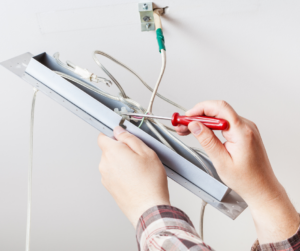Back to school! Training for electricians and contractors
Left your student days behind long ago? Not so fast. Contractors who are lifelong learners stand to benefit from ongoing training.
Struggling to win work or keep losing apprentices? Perhaps you’re getting ready to take over your boss’ business and feel overwhelmed about how to manage mountains of paperwork. Or maybe you’re keen to upskill in the next big thing in the industry.
There is a solution to your shortcomings, and deep down inside you know what it is: training.
Whether it’s accredited training through a registered training organisation (RTO) or high-quality, non-accredited training provided by an industry association or popular brand, learning new skills – technical or in running a business – helps to boost your offering and grow your business. No exaggeration, promise.
“I try to do one substantial course a year to keep my brain active and learn new things,” says Quentin Field, an electrotechnology teacher at TAFE NSW.
“That's the attitude we need to adopt – that our learning should never stop. The more you train, the more qualifications you get, the more likely you are to remain hireable and relevant in the future.”
Renewables training for electricians
If you want to expand your technical skills, many experts recommend doing so in renewables.
“What’s happening in renewables now is probably the biggest thing to happen in the electrical industry in its history,” Field says. “All electricians need to start looking into this area.”
Resolute Training is an RTO that offers a Certificate IV in Electrical (Renewable Energy), as well as separate accredited training modules rubber-stamped by the Clean Energy Council in grid-connected PV systems, grid-connected battery storage and stand-alone power systems. With a qualification like this, which can take between 45 and 170 hours to complete, contractors can survey sites for, design and install renewable energy systems.
The business benefits are simple, explains Compliance and HR Director David Wurth. “It just opens up this whole new world of a shedload of work for you,” he says.
Much of this work is set to come from builders increasingly showing a preference for contractors that can complete jobs end-to-end, from the formwork and rough-in, to the fit-out, renewables, telecommunications and security.
“You’ll become a preferred supplier because you can offer the whole gambit to a builder,” Wurth says.
“You can say, ‘I can do everything for you’, rather than having to go and find someone to do each little bit. It just makes you more saleable to the world.”
Renewables aside, you can boost your offering with accredited training in in-demand areas like cabling and programmable logic controllers.
Short courses for electricians
So, you’ve got the base knowledge you need to be able to do the job safely and well, and perhaps specialise in an area like renewables. Does that mean you can tick the training box for another 10 years or so? Not exactly. 
This is where non-accredited training comes into play, explains Chris Lehmann, National Advocacy Manager at Master Electricians Australia. “A lot of the learning that goes on top to keep your business ticking along you can get from product training and high-quality, non-accredited training,” he says.
“Perhaps you’re a sole trader, then you take on a partner. Or you move from just doing lights and power points and put on an aircon division. This is what non-accredited training is great for – learning the skills you need as you go on your trade journey, or simply helping you specialise in a niche.”
Much of it is product training provided by big brands and original equipment manufacturers (OEMs). “A lot of the really good OEMs are giving electrical contractors training in new products – this is how you install their products safely and compliantly using your underpinned knowledge of being an electrician,” says Lehmann, who has 38 years’ experience as an electrician and has clocked up 20 years in business.
Obviously, it pays to be aware of the vested interests at play, but Field agrees the benefits of this type of training can be impressive. “They often have fantastic programs, installer benefits and all kinds of incentives for electricians to do these courses,” he says.
Business training for electricians
Training that helps contractors with the business side of things is also popular, with industry associations getting in on the act. Master Electricians Australia runs The Master Program, which is specifically designed to help contractors grow their business and avoid common pitfalls.
“It’s a course that will take an electrical contractor who is new to the industry or has been running their business for a couple of years and walk them through the process of how to set their business up, how to grow their business, how to ensure compliance, and set up systems and safety frameworks,” says Robert Pearson, General Manager of Operations at Master Electricians Australia. “It will train you in the end-to-end running of your business.”
The lack of formal rubber-stamping can make it tricky to source reputable non-accredited training courses and providers. Pearson and Lehmann recommend using trusted brands, nonprofits and industry associations.
“Make sure the training is not just the sales tool to buy their product, and be careful what you find online,” Lehmann says. “We always recommend that people use a reputable provider or brand.”





Comments (0)
Write a Comment